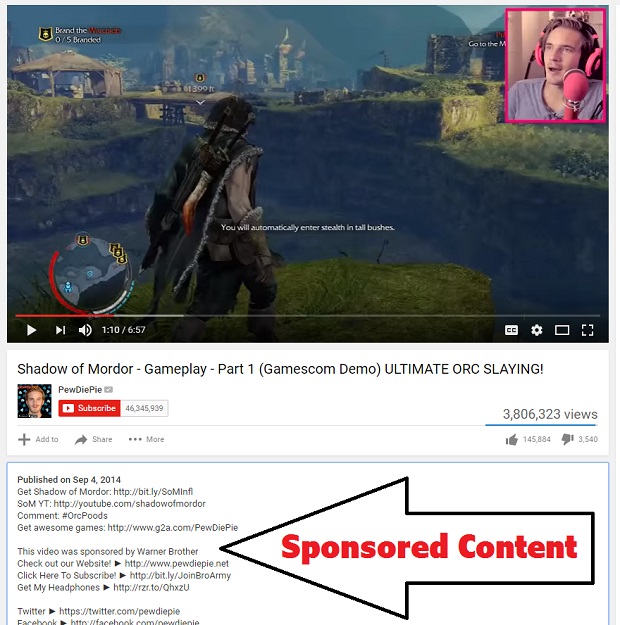As influencer marketing continues to grow in popularity, Warner Brothers studio has been reprimanded for not labeling sponsored content produced by YouTube stars, including PewDiePie, to promote a video game.
In the ruling the Federal Trade Commission (FTC) told Warner Brothers not to pass off any future advertising as the “objective, independent opinions of video game enthusiasts or influencers.”
The entertainment company spent “hundreds to tens of thousands of dollars” to get YouTubers to talk about its products.
Among them was PewDiePie, YouTube’s most followed personality, who was hired by advertising agency Plaid Social Labs on behalf of Warner Bros to promote Lord of the Rings video game: Middle Earth: Shadow of Mordor.
The studio was found to have instructed influencers to only reveal the promotional nature of the videos in the description section below the videos, where they could be easily missed by viewers.
The information too often appeared under the ‘show more’ tab in the description box (see below).

“Consumers have the right to know if reviewers are providing their own opinions or paid sales pitches,” said Jessica Rich, director of the FTC’s Bureau of Consumer Protection. “Companies like Warner Brothers need to be straight with consumers in their online ad campaigns.”
Under the ruling, Warner must ensure that in the future it does not allow the misrepresentation of advertising as “objective, independent opinions of video game enthusiasts or influencers.”
While Warner Bros. has not been fined, the FTC has prohibited it “from misrepresenting that any gameplay videos disseminated as part of a marketing campaign are independent opinions or the experiences of impartial video game enthusiasts.”
View one example video below:
This is not the first example of infleuncer marketing falling foul of regulators. Earlier in 2016, video game YouTube channel Machinima failed to disclose that it had paid two YouTube gaming personalities up to $30,000 to produce videos promoting Xbox One and various games.
The videos didn’t reveal that they were essentially ads and purported to be reviews, thus potentially deceiving consumers.
PewDiePie defends actions
In response, PewDiePie defended his association with the Warner promotion, and attacked the press for embroiling him in the controversy.
The YouTube Vlogger pointed out that his video did carry a disclaimer, albeit below the fold rendering it not immediately obvious. The video itself did not carry any verbal disclaimer.
“This is two years ago. A lot of YouTubers were involved in this sponsorship but since I’m the biggest YouTuber, my name is the only one that pops up,” he argued. “We weren’t required to disclose. I still did it. Some other YouTubers actually didn’t disclose it, but I’m getting all the shit for it.
“The FTC didn’t release guidelines to YouTube until 2015. And this video was in 2014. Because of this back then YouTube paid promotion was a bit of a grey area. Nevertheless, I still disclaimed it.”
He does concede, however, that: “Yes, I could have disclosed it better. I could have put it above the fold.”
Watch the PewDiePie reponse video here:

